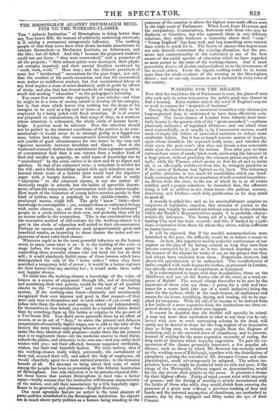WASHING FOR THE MILLION.
Now that the resultless din of Parliament is over, the plans of men who seek only in sober seriousness the public good may chance to find a hearing. Party warfare ended, the mind of England may set to work in earnest for "despatch of business." During the last few days, a movement towards a very obvious yet long-neglected duty is understood to have been effectively com- menced. The lower classes of London have hitherto been fami- liarly known by the generic title of the "great unwashed,"—a phrase pleasantly indicative of ingrained filthiness ; and one which when used reproachfully, as it usually is, by Conservative orators, would seem to imply the failure of unwearied exertions to induce more creditable habits. But it has at length become matter of inquiry, upon whose shoulders the reproach really rests ; and whether the stain upon the poor man's skin does not denote a less removable stain upon the consciences of his betters. Year after year we have increased our acres of smoky brick-work, environing the labourer in a huge prison, without providing the common prison requisite of a bath ; while the Thames, which seems to flow for all and to invite all, is as effectually withdrawn from him by stringent penalties as if the curse of Kehama had lighted on his head. The indecency of public ablutions is too much for sensibilities which can heed- lessly contemplate the foul accumulation of well-covered impurities : so, driven from the river, to the use of which he is at all events entitled until a proper substitute be furnished him, the offensive being is left to achieve in one dense room—his parlour, nursery, dormitory, and kitchen—such daily purification as he may stand in need of.
A remedy is called for ; and as its accomplishment requires no corporate or legislative sanction, this measure of justice to the people may happily be carried out without exposure to the obstacles which the People's Representatives would, it is probable, charac- teristically interpose. The hearty aid of a large number of the leading City men has been secured ; and this, if backed by a judi- cious cooperation from those for whom they strive, will be sufficient to insure success.
It will be objected, that if the needful accommodations were furnished to the poor, the difficulty would be to induce a resort to them. At best, this argument merely seeks the continuance of our neglect on the plea of its having existed so long that men have become corrupted by it ; just as it was deemed hopeless to raise the respect of the masses for works of art, on the ground that they had always been excluded from them. Experience, however, has shown the apprehension to be unfounded. The establishment of baths coupled with wash-houses for clothes, as proposed in London, has already stood the test of experiment at Liverpool. It is contemplated to begin with four foundations; three on the Middlesex and one on the Surrey side of the river, at a total ex- pense of 30,000/. The annual charge thereafter to be met by the payments of those who use them ; a penny for a cold and two- pence for a warm bath (the use of a towel inclusive) being the rates for the bathers, while at the wash-houses, all appliances and means for six hours scrubbing, drying, and ironing, are to be sup- plied for twopence. With the aid of an income to be derived from a few baths of a more expensive kind, the institutions are thus ex- pected shortly to compass their own support.
It cannot be doubted that the 30,000/. will speedily be raised. A sum not more than equivalent to what at any time can be col- lected with ease to erect unmeaning column to the dead, will surely not be denied to atone for the long neglect of an imperative duty to living men, to redeem our people from the disgrace of attending only to the outward show of cleanliness, and to prevent, instead of waiting for the more expensive necessity of curing, the long train of diseases which impurity engenders. To gain the co- operation of the classes personally interested, a few popular ad- dresses, such as those by which Mr. &tenor( has recently stirred up the working-men of Edinburgh, together with the distribution of pamphlets quoting the remarks of Dr. ANDREW COMBS and other physiologists, could advantageously be adopted. The widest im- pression, however, might be produced both on rich and poor, if the clergy of the Metropolis, without regard to denomination, would for one day devote their pulpits to the cause. It presents a theme for their highest efforts. Purity of mind cannot exist with impurity of person ; and the feeling of worship is utterly inconsistent with the habits of those who while they would shrink from entering the presence of a great man without a previous washing of face and hands and the outward assumption of cleanliness, are unabashed to remain, day by day, negligent and filthy under the eye of their Creator.


























 Previous page
Previous page